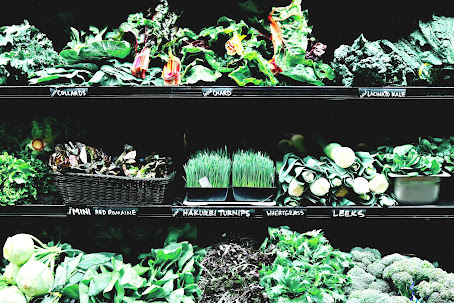Green vegetables are an essential part of a balanced and nutritious diet. They are rich in vitamins, minerals, fiber, and antioxidants .Here are some common green vegetables along with their nutritional benefits:
Green Vegetables:
1.Spinach: Rich in iron, calcium, and vitamins A and C , spinach is a versatile leafy green that can be used in salad, smoothies, and cooked dishes.
2.Kale: Packed with vitamins A,C, and K, as well as fiber and various minerals, kale is a nutrient - dense leafy green. It can be enjoyed in salads, soups, or as kale chips.
3.Broccoli : A cruciferous vegetables, broccoli is high in fiber, vitamins(especially vitamin c), and minerals .It can be steamed, roasted, or added stir-fries.
4.Green Beans : These are a good source of vitamins C and K, as well as fiber. They can be enjoyed steamed, or in casseroles.
5.peas : Green peas are is rich in protein, fiber, vitamins and minerals. They can be added to soups, stews, or enjoyed as a side dish .
6.Asparagus : This vegetable is high in fiber, folate, and vitamins A and K . It can be roasted, grilled, or steamed.
7.Zucchini : While often considered a summer squash, zucchini is a versatile and nutrient-rich vegetable. It can be grilled or used n various dishes.
8.Cucumbers: While technically a fruit, cucumbers are commonly treated as vegetables. They are low in calories and can be added to salad, sandwiches, or enjoyed as a snack.
9.Brussels Sprouts: These are rich in fiber, vitamin C and K, and contain antioxidants. Roasting or Brussels sprouts brings out their delicious flavor .
10.Lettuce (various types): Different types of lettuce, such as romaine, iceberg, or arugula, are commonly used as the base for salad.
Benefits:
Green vegetables are packed with essential nutrient and offer numerous health benefits. Here are some of the key benefits of including green vegetables in your diet:
1.Rich in Nutrients: Green vegetables are an excellent source of vitamins, minerals and antioxidants. They often contain vitamins A,C,K and folate, as well as minerals like iron and calcium.
2. Fiber Content : Green vegetables are high in dietary fiber, which is important for digestive health. Fiber helps prevent constipation, promotes regular bowel movements, and can contribute to weight management by promoting a feeling of fullness.
3.Low in Calories: Most green vegetables are low in calories, making them a great choice for those looking to maintain a healthy weight. They provide essential nutrients without adding excess calories to your diet.
4.Antioxidant Properties: Green vegetables rich in antioxidants, which help combat oxidative stress
in the body . Antioxidants play a crucial role in reducing inflammation and protecting cells from damage caused by free radicals.
5. Heart Health: The nutrients found in green vegetables, such as potassium and folate, contribute to heart health. These vegetables may help lower blood pressure, reduce the risk of cardiovascular diseases, and support overall cardiovascular function.
6. Bone Health: Green leafy vegetables like kale and broccoli are good source of calcium and vitamins K, which are essential for maintaining strong and healthy bones..
7.Blood Sugar Control: some green vegetables have a low glycemic index, which means they have a minimal impact on blood sugar levels.
8. Cancer Prevention: The antioxidants and phytochemicals in green vegetables have been associated with a reduced risk of certain cancer. Cruciferous vegetables, such as broccoli and brussels sprouts, are particularly known for their potential cancer-fighting properties.
9. Improved Digestive Health: The fiber content in green vegetables promotes a healthy digestive system by preventing constipation and supporting the growth of benefits gut bacteria.
SHERI BLOGS
